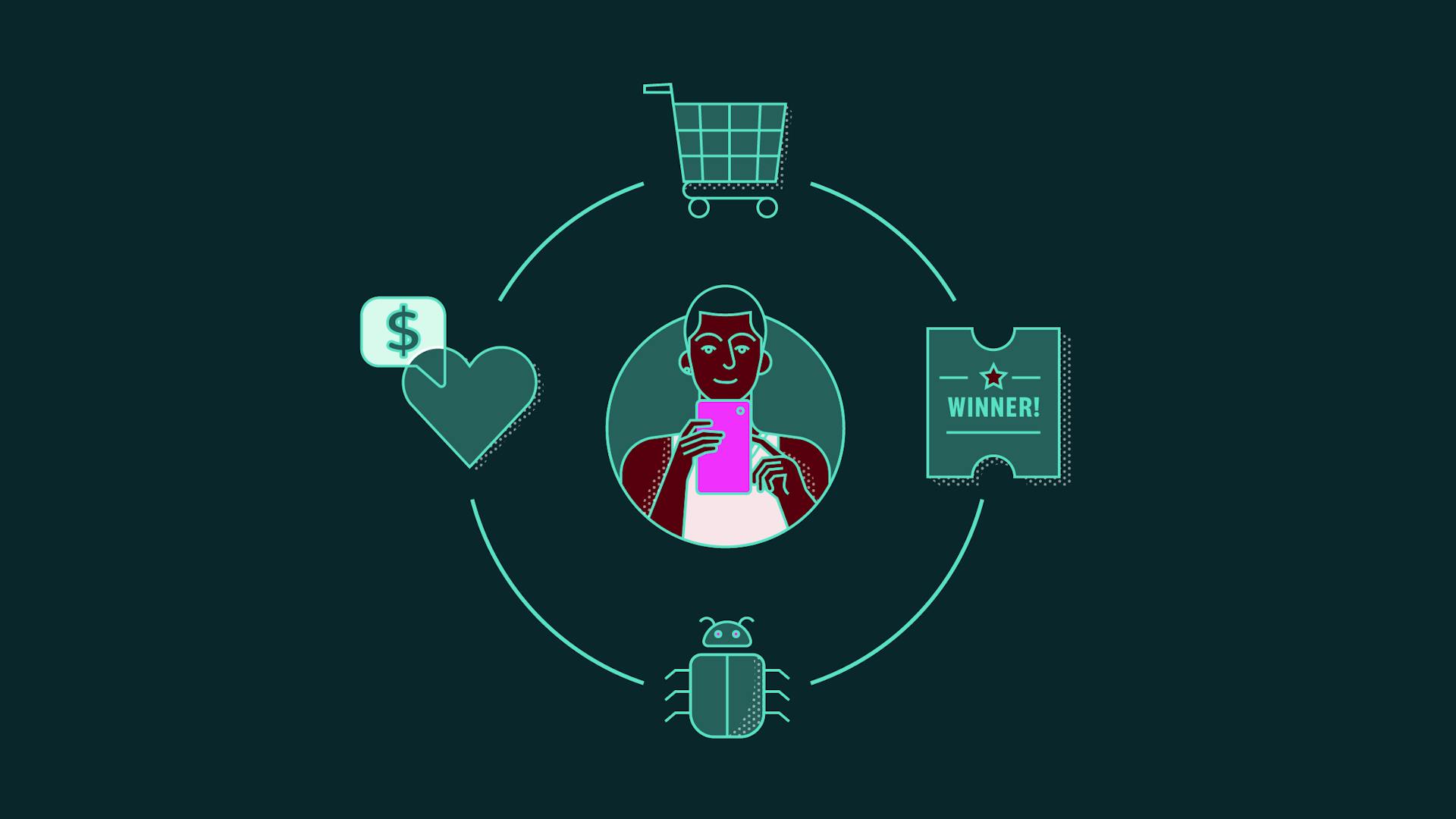Unmasking the 6 biggest online scams & how to avoid them
We’ve mapped the frequency of the biggest online scams over the past eight years to show how things have changed, as well as revealing some expert tips on how to protect yourself from online scammers.


Chris Hooper
Don't miss the chance to explore the latest trends and gain actionable insights essential for combating fraud and protecting your business. Download our Identity Fraud Report 2024 today!
We’re spending more time online than ever, and with advances in technology, such as the metaverse, that only looks set to increase. However, there are criminals everywhere –as more of our lives take place online, scams are on the rise, and scammers will continue to look for new opportunities.
Recently published data from the Federal Trade Commission reveals that the FTC received fraud complaints from 2.6 million individuals in the past year, almost identical to 2022. Among the various types of scams reported, imposter scams emerged as the most frequently cited category, with notable upticks observed in reports involving business and government impersonation. With the internet connecting us internationally, the importance of global identity verification software will increase. While the metaverse could help to develop more online avatars and accounts, biometric authentication is crucial.
The evolution of online scams
Like other types of deception, digital scams have a longer history than commonly realized. The practice of email phishing is said to have originated in the early 1970s, although it gained widespread usage and its term in the mid-1990s. Since then, fraudulent activities online have expanded, ranging from fraudulent email accounts to exploiting information obtained from extensive data breaches. The largest recorded loss from a single email scam amounted to $47 million.
Interestingly, the infamous 419 scam, also known as the Advance-fee or Nigerian Prince scam, emerged as mail fraud in the 1980s.
However, email isn't the sole medium exploited for scams. Mobile phone scams emerged in the 1980s, when mobile phones became available, predating their widespread use. Text message scams, where individuals are urged to quickly send funds to a specified account under the guise of a family member, began shortly thereafter, but didn't surge until the 1990s, when mobile phone usage increased significantly.
More recently, scams like Pig Butchering have gained prominence. This sophisticated type of fraud involves scammers forming long-term relationships with victims, often over social media or dating platforms, before convincing them to invest in fraudulent cryptocurrency or stock schemes. Once the victim has invested large sums of money, the scammer disappears, leaving victims with devastating losses. This manipulation of trust and emotions makes it one of the most financially destructive scams today.
At Veriff, we wanted to explore how the biggest scams on the internet have evolved over the years. We looked at ONS Crime in England and Wales Statistics data, which uses Crime Survey for England and Wales (CSEW) data, for the past eight years to map how the crimes that took place online have varied.
Online shopping scams have consistently been the most common for the past eight years, averaging 68,190 incidents of people falling victim a year on shopping websites despite seeing an overall decline of 12%. With the rise in online shopping websites and the ability for shops to link out to their eCommerce sites from social media, it’s easy to see why these scams are so common.
Advance fee frauds, which are scams where people are promised a larger reward that will come later for a smaller sum of money now, came in second place consistently, with an average yearly figure of 28,368. Despite average yearly instances being less than half of the most common scams, advance fee frauds have increased by a whopping 43% over the past eight years.
Hacking scams have seen the biggest increase over the past eight years, jumping by an incredible 274%. There has been a huge increase in people sharing more personal information than ever on social media. Still, these apps require little verification, and there is a major risk of people being catfished or scammed.
Lottery scams have decreased by the most enormous amount and occur 46% less than they did eight years ago. The National Lottery has a page on its website about scams and is taking active steps to help people avoid being scammed.
How to avoid the biggest online scams
1. Online shopping scams
Online shopping scams are a significant problem today, with the pandemic turbocharging the shift to digital retail.
The UK’s National Cyber Security Centre (NCSC) offers a range of advice for customers to help ensure they shop online securely. They should choose where they shop carefully, for instance, researching online retailers to check their legitimacy and reading feedback from people or organizations they trust.
Additionally, the NCSC guide suggests using a credit card for online payments, with most major credit card providers offering protection for online purchases and obliged to provide refunds in certain circumstances.
The NCSC also says shoppers should provide only enough details to complete their purchase, keep their accounts secure, notably by using strong and unique passwords for important accounts, and watch out for suspicious emails, text messages, and websites.
If it seems websites offer deals that are too good to be true, remember to do your research.
2. Pig Butchering scams
One of the most notorious online scams gaining ground in recent years is the so-called "Pig Butchering" scam. This elaborate scheme involves scammers nurturing a relationship with their victim over weeks or even months, similar to "fattening a pig" before the slaughter. The fraudsters typically meet their targets on social media or dating apps, gradually building trust before persuading the victim to invest in fake cryptocurrency or stock trading platforms.
Once the victim has invested large sums of money, believing they are securing a profitable return, the scammer "butchers" the relationship, disappearing with the victim's funds. Pig butchering scams can be devastating, with victims losing life savings, as the scam artists prey on emotions and trust to orchestrate their con.
These scams are a stark reminder of the importance of verifying the legitimacy of online financial opportunities and remaining cautious about sharing personal information with new acquaintances online.
3. Advance fee frauds
This scam involves payment in advance for a promise of wealth, wills, gifts, prizes, or employment, according to the Police Service of Northern Ireland (PSNI). Examples could include a request to send money, for example, a payment of £10 to release a large cash prize or lottery jackpot. Other common instances could involve a series of payments to help get money out of someone’s country after they’ve suffered an implausible series of events.
The PSNI says people should not respond to this type of approach, as they will be targeted as part of a ‘suckers’ list. It recommends never sending money via transfer to someone you’ve never met and to be cautious of anything that seems too good to be true - sit back and think about if this situation seems likely.
4. Computer software service fraud
Computer software service fraud occurs when fraudsters posing as legitimate companies, such as your internet service provider (ISP) or Microsoft, call to tell you that there’s a problem with your computer. They might say a computer virus or your internet connection isn’t working correctly. The ultimate aim is to gain remote access to your computer by visiting a particular website or installing software and for you to provide them with payment details, notes Action Fraud. Nearly 18,000 victims reported total losses of nearly $588 million in 2022, according to a report issued by the FBI’s Internet Crime Complaint Center.
This scam can be prevented by never allowing someone else to take control of your computer, never downloading software, and remembering that no reputable company will ever contact you out of the blue, according to the Met Police’s little guide to preventing fraud and cybercrime. They advise that if you’re unsure, you should contact your service provider directly to confirm.
5. Hacking (social media and email)
Your emails and social media contain a wealth of private information, so they could easily become a target for criminals. To ward off the danger of hacking, a number of key steps should be taken.
West Sussex County Council in the UK offers five top tips. First, use a separate and strong password for your email account. Second, create different strong passwords for all of your online accounts. Third, turn on two-factor authentication. Fourth, update devices regularly, and finally, back up your data.
6. Computer viruses / malware
Viruses pose various dangers, from capturing passwords to stealing credit card details or holding files for ransom, notes BeCyberSafe.
Outlining the best ways to protect your computer from such threats, it says users should ‘dodge, deny, detect’. This means you ‘dodge’ by practicing safe habits to avoid your computer being exposed, you ‘deny’ by making it difficult for viruses and malware to install themselves, and you ‘detect’ by catching any that do.

Online scams have increased and decreased most over time
Unfortunately, fraudsters are opportunistic and adaptable. Online scams evolve all the time.
The scams with the most frequent variation are passport application fraud and HMRC (His Majesty's Revenue and Customs) fraud.
Passport fraud
In 2023, passports remained the predominant counterfeit document observed by our clientele, a trend consistent with our analysis over the past three years. They constituted 48% of all counterfeit documents detected in 2023.
Online scams
According to the Data Book, individuals fell victim to scams amounting to $10 billion in 2023, marking a $1 billion increase from the previous year and reaching the highest reported losses to the FTC. Surprisingly, despite a consistent number of reports (2.6 million) compared to the previous year, one out of every four individuals reported financial losses due to scams, with a median loss of $500 per person. In 2017, there was a sharp rise in hacking (extortion) scams. The 258% increase may be explained by the rise in bitcoin and scammers feeling they can hide behind anonymized accounts while extorting their victims. There have been concerns about the lack of regulation in crypto, but there are regulations that mean that crypto companies must be AML and KYC compliant.
How Veriff can help
Veriff’s Identity and Document Verification solution combines AI-powered automation with reinforced learning from human feedback, and if required, manual validation. With support for more than 11,500 document specimens from more than 230 countries and territories, we offer speed, convenience, and reduced friction to convert more users, mitigate fraud, and comply with regulations.
Veriff stands out because of its emphasis on intelligent decision-making capabilities and video-based identity verification. Recognizing that fraud patterns constantly evolve, Veriff regularly adapts its technology to remain one step ahead of fraudulent activities. In addition to providing robust fraud protection, Veriff also maintains a seamless user interface.
Learn more
Get the latest from Veriff. Subscribe to our newsletter.
Veriff will only use the information you provide to share blog updates.
You can unsubscribe at any time. Read our privacy terms


